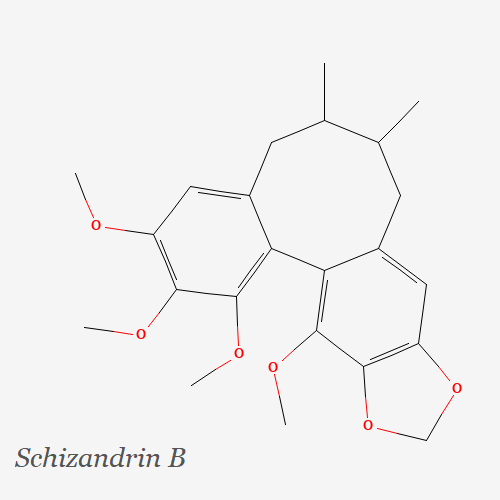
Introduction
Schisandra chinensis, commonly referred to as the five-flavor fruit, is a plant indigenous to northeastern China, Japan, Korea, Manchuria, and the eastern regions of Russia. This fruit possesses a unique taste that encompasses sweet, bitter, pungent, salty, and sour flavors. It is extensively utilized in traditional Chinese medicine, Western herbal therapy, and Russian adaptogen treatments. Schisandra chinensis is recognized for its ability to enhance disease and stress tolerance, boost energy, endurance, and physical performance. Additionally, it has been employed as a preservative and additive in the food industry to improve flavor and nutritional value. As an adaptogen, Schisandra chinensis is a natural compound that allows the body to manage both physical and mental stressors. By fostering homeostasis or a balanced state, adaptogens like Schisandra chinensis contribute to the maintenance of overall health and wellbeing.
Traditional Chinese Medicine (TCM) has been using Schisandra chinensis for centuries to treat a variety of ailments, including liver diseases, coughs, asthma, and insomnia. TCM practitioners believe that Schisandra chinensis can improve overall health by balancing the body’s energy, and supporting the liver, which is considered to be the organ responsible for maintaining overall health. In TCM, Schisandra chinensis is believed to have five tastes, including sour, sweet, salty, bitter, and pungent, which correspond to the five elements of nature - wood, fire, earth, metal, and water. TCM practitioners believe that the combination of these five tastes and elements can help to balance the body’s energy and promote healing.
Bioactive Constituents

Schisandra chinensis fruits are rich in various compounds, such as sugars, tannins, essential oils, triterpenoids, organic acids, phenolic acids, flavonoids, vitamins C and E, phytosterols, and bioelements. These components contribute to the numerous health benefits associated with the fruit. Lignans, primarily found in Schisandra chinensis fruits, are the main bioactive components that exhibit numerous biological activities, including antioxidant, anticancer, anti-platelet, anti-inflammatory, and central nervous system protection. Lignans are a class of naturally occurring phenols formed by the oxidative dimerization of two phenylpropanoid units. Approximately 40 types of lignans, mostly dibenzocyclooctanes, have been identified in Schisandra chinensis.
Schizandrins are bioactive lignans that are believed to improve memory impairments through their antioxidative effects. Tissue distribution studies have shown that schisandrin B and schisandrol B are distributed throughout various tissues and mainly accumulate in the liver and kidneys. Schisandrin has been demonstrated to protect against neurotoxicity and enhance cognitive function in animal models, promoting the recovery of myocardial tissues and relieving acute myocardial ischemia in mice.
Schisandrin A (Deoxyschisandrin) has been reported to exhibit neuroprotective effects in various cell lines. Studies on the effects of schisandrin A on Aβ1-42-induced memory impairment in mice showed that schisandrin A significantly improved cognitive performance in several tests, with the authors attributing this effect to an antioxidative mechanism. Schisandrin A has also been found to protect heart function and decrease myocardial ischemia-reperfusion injury in rats.
Schisandrin B has been shown to be a highly effective neuroprotective agent. Research has indicated that it can repair memory disorders, protect neuronal cells from neurodegeneration, and reduce brain inflammation. Schisandrin B functions by increasing anti-apoptotic proteins, reducing pro-apoptotic proteins, inhibiting the production of reactive oxygen species, and modulating apoptotic signaling pathways. Apart from its neuroprotective effects, schisandrin B has also been shown to improve cognitive performance in animal models of memory impairment and protect against brain oxidative stress while enhancing mitochondrial antioxidant status. Additionally, schisandrin B has been found to improve depressive behavior in mice by modulating serotonin levels, serotonin receptors, and brain-derived neurotrophic factor. Moreover, schisandrin B has been shown to promote neurogenesis or the growth of new neurons in the adult brain, suggesting its potential as a novel neuroprotective agent for the treatment of neurodegenerative diseases.
Schisantherin A is a neuroprotective lignin that helps prevent damage caused by oxidative stress in the brain. It has been shown to restore antioxidant levels and protect against cognitive deficits in Alzheimer’s disease mouse models. α-isocubebenol and Gomisin A have been found to exhibit antioxidant effects in human-derived neuronal cell lines, protecting them from oxidative stress-induced cell death. They have also been shown to stimulate the expression of antioxidant response genes.
Health Benefits
Schisandra chinensis dried fruits, their extracts, and bioactive constituents provide numerous health benefits under normal and pathological conditions. These bioactive compounds serve as antioxidants, detoxifiers, potent liver protectors, hypoglycemic agents, inflammation reducers, neuro- and cardioprotectors, and immunostimulants.
Research has shown that Schisandra chinensis may offer several potential brain health benefits, such as enhancing cognitive function and reducing oxidative stress. Neuroinflammation is an immune system response in the brain to injury or disease, which can result in chronic inflammation and damage to brain cells. Schisandra chinensis contains various bioactive compounds with anti-inflammatory properties that may help minimize neuroinflammation and safeguard brain cells. In fact, lignans extracted from Schisandra chinensis demonstrated neuroprotective effects in rats with Parkinson’s disease by reducing neuroinflammation. Furthermore, schisandrin suppressed inflammation in cells by inhibiting the production of pro-inflammatory cytokines.
Multiple studies suggest that Schisandra chinensis berry preparations and individual compounds may offer potential heart protection. However, most of these studies are limited to laboratory-based models. The cardioprotective potential of Schisandra chinensis berries may be associated with their antioxidative properties at the cellular level, as oxidative stress contributes to the development of cardiovascular diseases. The effectiveness of Schisandra chinensis lignans depends on factors such as administration method, model type, dosage, and experimental method.
Schisandra chinensis also exhibits adaptogenic properties, as demonstrated by its ability to alleviate stress. Research indicates that the herb’s extract can lower stress hormone levels in the blood, improve adrenal gland function, and normalize stress hormone levels. These findings suggest that Schisandra chinensis may be beneficial in managing stress-related health issues.
Moreover, Schisandra chinensis has been proven to increase energy and enhance endurance. Studies reveal that the herb’s extract can improve exercise performance, raise energy levels, and extend time to exhaustion. This makes Schisandra chinensis an appealing option for individuals seeking natural methods to boost their physical performance and overall vitality.
The safety of Schisandra chinensis berry preparations has been discussed in several articles, with traditional use considering it a non-toxic tonic. Research has demonstrated that Schisandra chinensis extracts exhibit minimal or no toxicity in various animals. However, there is a lack of comprehensive clinical trials investigating human responses to Schisandra chinensis berry doses and their safety in treating different diseases, including cardiovascular diseases. Further research is necessary to explore the potential cardioprotective benefits and safety of Schisandra chinensis berries and their compounds.
In conclusion, Schisandra chinensis is a powerful adaptogen with a wide range of health benefits. Its rich profile of bioactive compounds, including lignans, schisandrin, and gomisin, contribute to its antioxidant, anti-inflammatory, cognitive-enhancing, stress-reducing, and energy-boosting properties. As a versatile and potent natural remedy, Schisandra chinensis holds great promise for improving overall health and wellbeing in today’s fast-paced, stress-filled world.